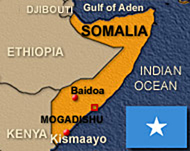Somali parliament rejects government
The Somali parliament has voted to reject a new government less than two weeks after it was appointed.

The move has complicated attempts to restore stability to the broken Horn of African country, officials said on Friday.
The legislators were protesting against a decision by President Abd Allah Yusuf to swear in a cabinet without first having his prime minister submit it to parliament for approval, as a transitional constitution requires, diplomats said.
Yusuf’s supporters said the move by lawmakers meeting in the safety of neighbouring Kenya posed a threat to painstaking efforts to stabilise their chaotic country, which has been carved into militia fiefdoms for the past 13 years.
“The MPs should apologise to the Somali people and to the cabinet, which they have damaged,” Yusuf’s spokesman, Yusuf Muhammad Ismail, said.
Future unknown
Ismail said the move did not amount to a no confidence vote but he was not sure what would happen next. The cabinet was holding an emergency session to discuss the move, he added.
 |
|
Somalia has been in a state of |
Most of the cabinet of 34 ministers and 54 assistant ministers or ministers of state was sworn in on 1 December in Nairobi, the culmination of two years of peace talks held in Kenya because of security fears at home.
It is Somalia’s 14th attempt at establishing a national government since 1991, when regional commanders toppled dictator Muhammad Siad Barri and carved the country into clan-based fiefdoms.
Hundreds of thousands of people have been killed in violence or have died through war-related famine and disease since then.
Representation by clan
The cabinet was meant to be selected according to a formula agreed at the peace talks that gives equal proportions of jobs to the four major clans and a smaller portion to a minor clan.
But since the cabinet’s announcement a number of clans have grumbled that Yusuf, an Ethiopian-backed military leader, has failed to ensure they were given their rightful share of posts.
“This vote is a twofold message: One to neighbouring states that ‘this assembly is a national force to be reckoned with, so do not try to influence our institutions’ and second that the
president must work through parliament and respect the constitution,” an African diplomat said.
Rivalries among Somalia’s neighbours have periodically plagued the reconciliation process. At various times delegates from Ethiopia, Eritrea, Saudi Arabia, Egypt and Djibouti had appeared to want to engineer the installation of their own compliant administration.